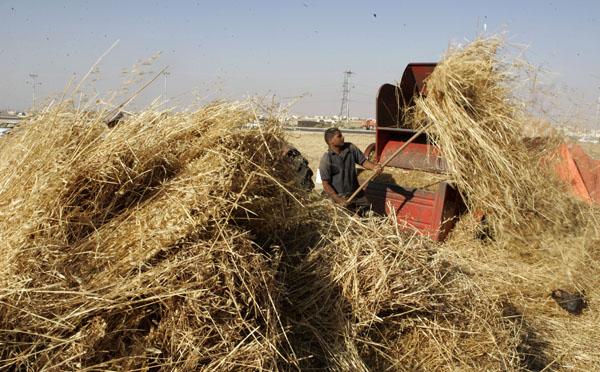You are here
Cereal leaf miner infects 5% of land planted with wheat, barley
By Hana Namrouqa - Apr 25,2015 - Last updated at Apr 25,2015
AMMAN — Almost 5 per cent of the land planted with wheat and barley in the country has been infected with the cereal leaf miner, a worm that infests grains, a government official said on Saturday.
Wheat and barley were cultivated on 872,499 dunums of land for the 2014/2015 agricultural season, Agriculture Ministry Spokesperson Nimer Haddadin told The Jordan Times.
“Some 39,310 dunums, or 4.5 per cent, of land planted with wheat and barley have been infected by the cereal leaf miner this year. The infected land is in the Karak, Mafraq, Madaba, Ajloun and Irbid governorates,” Haddadin said.
Combating the pest, which starts infecting wheat and other cereals in February and feeds on crops until April, is very difficult, according to the ministry, which said farmers stand to incur heavy losses if they do not follow instructions to curb cereal leaf miner infestation.
“The wheat and barley crops are safe as 90-95 per cent of the pest was terminated. Wheat and barley production will not be affected,” Haddadin underscored.
The ministry started spraying land planted with cereals in early March, he said, adding that it purchased 1,455 litres of pesticides to combat the cereal leaf miner and used 1,216 litres in its campaign to stop the worm’s infestation.
“The ministry treated 32,310 dunums, or 82.2 per cent, of the infected area across the five governorates, and 2,136 farmers benefitted from the campaign,” Haddadin noted.
He explained that the ministry was unable to treat 17.5 per cent of the infected area due to several factors, including low crop infestation on some farms and the consecutive depressions which brought rain and impeded the movement of its agricultural vehicles.
Because combating the worm is very difficult and causes losses to farmers, the ministry urged farmers to follow its instructions to prevent the cereal leaf miner from attacking their crops.
Such measures include crop rotation, under which farmers plant different crops on their land in a sequence, according to the ministry, which said that proper crop rotation is a means to control pests that become established in the soil over time.
In addition, farmers are advised to plough their land at a depth of 30-40 centimetres because the cereal leaf miner inhabits inner soil and deep ploughing allows the sun to reach the pest and kill it, according to the ministry.
“The ministry will show more support to farmers who adhere to its instructions and adopt crop rotation. Such support entails giving these farmers priority in using the ministry’s agricultural vehicles for ploughing and spraying pesticides,” Haddadin said.
Related Articles
A fifth of the land planted with cereals in Karak Governorate is infected with the cereal leaf miner, a worm that infests wheat and barley among other grains, officials said on Sunday.
The Ministry of Agriculture on Thursday warned that the recent rainfall might increase chances of wheat crops being infected with wheat leaf rust, a fungal disease that affects wheat primarily among other grains.
A total of 7,000 dunums in the Southern Mazar District in Karak are infected with the cereal leaf miner, Nasser Masarweh, the district’s agriculture director, said Wednesday.













